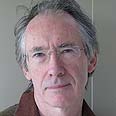
But as a British novelist whose protagonists are shaped by often violent historical fate, McEwan makes no apology for coming to Israel after what he describes as lifelong fascination with its freedoms mixed with misgivings about its tactics.
"If you didn't go to countries whose foreign policy or domestic policy is screwed up, you'd never get out of bed," he told Reuters at the beginning of a visit to receive the main prize at the annual Jerusalem International Book Fair.
"No, let us come and engage, keep talking. The worst thing that is going to happen is when everyone stops talking," he said, responding to the complaints of a small coalition of pro-Palestinian artists and academics in Britain and Israel who had demanded he back out.
McEwan planned to tour Jerusalem, the stone-walled heart of the Middle East conflict, and meet Israeli authors like David Grossman, whose meditations on the nation's ills were shot through with tragedy when he lost a son to the 2006 Lebanon war.
But Palestinian writers McEwan had hoped to see begged off.
"The message has come through to me that they can't meet me. They won't meet me. Pressure has been brought to bear - I guess, of a parallel but probably much more vigorous kind than was brought to bear on me," McEwan said, without naming them.
Fatwa and freedom
McEwan's friend and fellow British writer Martin Amis has taken flak in the Op-Ed pages for remarks perceived as overly sympathetic to Israel and hostile to the Muslim world post-9/11.
In his 2005 novel "Saturday," McEwan assayed the benefits of the Iraq war. Mention of Israel or Israelis flits through three of his books. Holocaust references surface elsewhere.
"This has never been a central matter of my work, but it floats in," McEwan said.
"I'm really not all that conscious of it, but without even setting foot in Israel the situation has dominated political thought and reality and one's sense of being in the world of politics as an adult."
He cast his ideological concerns as more global -- for the endurance of Western liberties in the face of challenges like Iran's 1989 fatwa against Salman Rushdie over the British author's literary rendition of the Prophet Mohammed.
Al Qaeda's attacks of 2001 and the ensuing US-led "war on terror" further stoked debate about a confrontation of cultures.
"There is a great chunk, an interesting chunk of the British Left that have got into bed with bits of radical Islam. What binds them is a hatred of the United States," McEwan said.
"(But) there is a huge middle bit of intellectual people. Many, many people came up to me and said, 'I'm glad you're going. I hate what they (Israel) are doing, but I'm glad you're going.' People who want Israel to exist, rather than not exist."
At a time of anti-authoritarian tumult in the Arab world, McEwan voiced hope that Israel might "proselytize" its democratic values rather than expand West Bank settlements on occupied land where Palestinians have struggled for statehood.
"I don't think Israel can prosper unless Palestine prospers," he said.
"There's a circle of Dante's hell where people have a high wall around them, and they sort of flourish but they can never get to heaven, because they can never get over the wall. They never get out of hell. That is not prospering."
- Follow Ynetnews on Facebook















